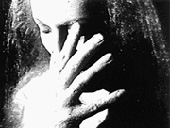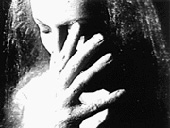Part of Fall 1995
The search for answers about one’s identity inevitably leads to the past. This return often leads to the very beginning, so to speak; to one’s mother. This evening’s program brings together a diverse collection of recent films and videos that explore the often tortured relationship between mother and daughter. Each of the works explores childhood trauma as a way to exorcise the past. Drawing on such diverse material as Charcot’s 19th-century analysis of ‘female hysteria’, gender roles in I Love Lucy and a critique of psychoanalysis and shock therapy, these works offer a sharp contrast to Hollywood’s appetite for portraying women dependent on psychiatric support.
Mindy Faber’s Delirium uses the extended metaphor of her mother’s body to reflect on ‘hysteria’ as a form of rebellion, reinterpreting the stereotype of the mad housewife. Margaret Stratton’s Kiss the Boys and Make Them Cry produces a sustained rage about childhood, suicide, therapy, lesbians and learning to cope without Prozac. Nina Fonoroff’s Accursed Mazurka exquisitely interweaves a personal portrait of life in and out of therapy against a background of Hollywood’s leading crazy women. Milada Kovacova’s film Searching For My Mother’s Garden expands on the notion ‘mother hysteria’ by investigating the phenomenon of being removed from one’s motherland yet remaining tied to one’s origins.
Notes:
MOTHER HYSTERIA
From Madness to the Motherland
Delirium, Mindy Faber, 1993 (video 23 min.)
Defiantly humorous in tone, Delirium looks back at a mother’s mental history, one which had been diagnosed and labeled as ‘female hysteria’. While never reducing her mother’s condition to a single explanation, Faber firmly and convincingly links her mother’s illness to the historically embattled position women hold in a patriarchal culture. Delirium contends that female mental illness must be understood within a wider political and social context and that in many instances women’s reactions to violence, anger and depression are indeed sane responses to abhorrent situations.
Kiss the Boys and Make Them Die, Margaret Stratton, 1994 (video 30 min.)
Kiss the Boys and Make Them Die is an autobiographical tape that explores how memory, sexuality, and the self are created through the family story. Stratton’s video chronicles how the social act of loving women becomes channeled into narratives of incest, desire for the mother, loss of the father, separation from the family, death, and self-destruction. In this work, sexuality, difference, and language are paralleled with haunting memories of a childhood ghost that both desires and hates women. Kiss the Boys is about childhood trauma and the adults need to exorcise the past and create an independent self.
[INTERMISSION]
Searching For My Mother’s Garden, Milida Kovacova, 1992 (16mm, 12 min.)
‘In Searching For My Mother’s Garden I drew upon the metaphor of the ‘garden’ as representative of the ‘womb’, weaving notions of ‘motherland’, the practice of female hysteria and Mother Mary stories together.’ (M. Kovacova)
Partially shot in rural Czecho-Slovakia Searching For My Mother’s Garden explores the personal dilemma of no longer being rooted to a ‘motherland’ and yet still being tied to one’s origins.
Accursed Mazurka, Nina Fonoroff, 1994 (16mm, 40 min.)
Obsessive journal entries, clinical reports, Chopin’s mazurka, and a series of watercolors depicting a pierced and bleeding brain are among the many elements that make up a narrative around the occasion of mental breakdown. Instruments of electrical transmission are metaphors for the diseased brain, as reconstructed by a women who has lost her reason, her body, and her foothold in personal identity. The unseen protagonist at first attributes her illness to repeated hearings of a Chopin mazurka on the radio. Radio static, a telephone switch board gone awry, a women imagistically redoubled playing the accordion, become points of departure for a rant situated in the remembrance of a mental state so extreme as to make impossible any attempt at representation. Like an over wound mechanism, her account of the patient’s ‘symptoms’ and ‘progress’ reveal the ineffectuality of conventional mental health treatment, while the patient offers hyperbolic excesses in describing her experience. On the road recovery, she searches for possible causes for this lapse of sanity. Her provisional understanding makes reference to 1963 home movie of her family dancing on the lawn of their house: ‘It is not for me to ransack scenes of the past for clues or explanations… So, let these people dance in peace… they have done nothing wrong… there is no culpability to be found among these shadows.’ (N. Fonoroff)
BIO’S:
Mindy Faber is an award-winning independent video producer and the Associate Director of the Video Data Bank in Chicago. Faber has been producing videos since 1985 when she made her highly acclaimed Suburban Queen. Faber completed her under-graduate work at the University of Kentucky and received her MFA in Video from the School of the Art Institute of Chicago. She has received grants from the American Film Institute, the NEA and the Illinois Arts Council. Delirium has won several awards including the Main Prize at the Berlin Film Festival’s Videofest ’94 and First Prize at the 1993 Atlanta Film & Video Festival in the experimental category.
Margaret Stratton received her MFA from the University of New Mexico in 1986. She is currently an Associate Professor at the University of Iowa. She has been a visiting professor at Cornish College of the Arts in Seattle and the School of the Art Institute of Chicago. Her work has been exhibited widely, including the Smithsonian Institute, Museum of Contemporary Photography and the Chicago Art Institute . She has received numerous grants and awards including a NEA/Jerome Foundation Fellowship, NEA/Rockerfeller Award and a public works grant from the Seattle Arts Commission.
Milida Kovacova is a visual artist and filmmaker who spent her childhood both in North America and behind the Iron Curtain in Czecho-Slovakia. Beginning as a painter Milida shifted to filmmaking in order to explore the possibilities of multi-layering in a time based medium. Her films include Skin Flick, The Dance of Life, Continuum, Dislocation and Dislocation II. She is currently in post-production on Salt of the Earth.
Nina Fonoroff is an Associate Professor in the Film Department at the Massachusetts College of Art. She has also taught at the Hampshire College and the University of Wisconsin-Milwaukee. She holds a BFA from Massachusetts College of Art and a MFA from the San Francisco Art Institute. Her films have been shown at numerous showcases, festivals and museums in the US, Canada and Europe. Accursed Mazurka won the Jurors Choice Award at the Black Maria Film and Video Festival in 1994 and an Honorable Mention at the 1994 Ann Arbor Film Festival.

